#Pietro Francisci
Explore tagged Tumblr posts
Photo



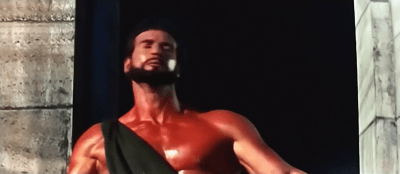


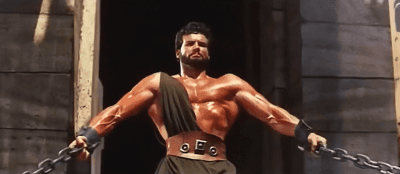
Steve Reeves as Hercules (1958)
#steve reeves gif#hercules gif#50s fantasy movies#sword and sandal#italian movies#le fatiche di hercole#pietro francisci#mario bava#50s movies#greek mythology#1950s#1958#gif#chronoscaph gif
278 notes
·
View notes
Text

Gino Cervi-Sylva Koscina "La batalla de Siracusa" (L´assedio di Siracusa) 1960, de Pietro Francisci.
9 notes
·
View notes
Text
Greek mythology media (1)
To begin this overview of Greek mythology in media, I originally wanted to start with some of the most famous American pieces of fiction - those that shaped, for the better and for the worse, the "Americanized" perception of Greek mythology... Including Disney's Hercules.
However after some thought, I think I need to cover something else beforehand... What I like to call the "Hercules saga".
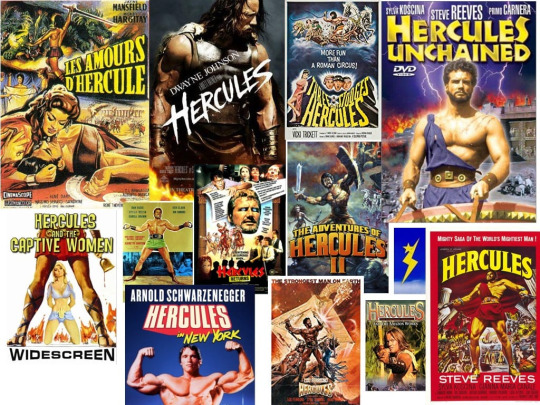
(Picture courtesy of greekgodsparadise.com)
Have you ever wondered why Disney made a movie about Herakles and yet named him "Hercules"? Why would Disney commit such a blatant mistake, using the Roman name of the hero despite everything else being (vaguely) Greek-inspired? Because Roman mythology is better known than the Greek (see my Medusa posts)? Not exclusively...
The reason why Disney made a movie named "Hercules" instead of "Herakles" was because their animated piece was very obviously a follow-up of an entire GENERATION of movies based on the figure of Herakles, but being sold, publicized and shared with the name "Hercules". Beyond this "mistake of Disney" is actually an entire generation of cinema history that people today completely forgot about, and that explansi why, of all the Greek myths, the one of Herakles is supposedly the one with the most movies attached to it...
I/ The beginning of it all
To start this deep dive we need to begin with the movie that started it all. The 1958 "Hercules" movie - at least it was its English title. Its original title was "The Labors/Trials of Hercules", "Le fatiche di Ercole". For yes, this movie was an Italian production (with some Spanish and French collaborations).
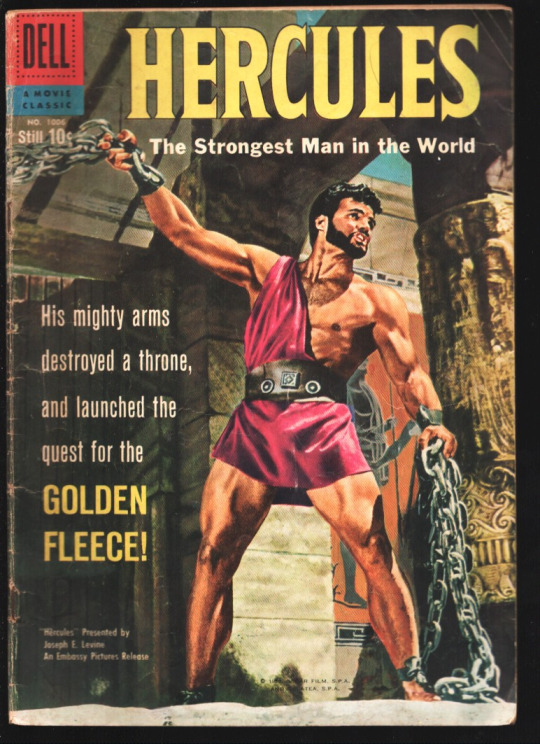
This movie's story is... quite more confusing than you would expect. Yes, the title is correct: Hercules is the main hero of the story. This being an Italian production, all the names were taken from Roman mythology rather than Greek - Hercules, Jupiter, Venus... And this is precisely why the name Hercules would go on to become so famous, but that's for later. However, despite what the title hints, this story isn't about the Twelve Labors of Herakles. Two of these trials appear in the first third of the story: the Nemean Lion and the Cretan Bull. However, the actual literary work of Antiquity this movie is based on is... the Argonautica of Apollonios of Rhodes. Yes, this movie is also about Jason, and the Argonauts, and the quest for the Golden Fleece, but with Jason being only a secondary character. In fact, most of the Argonauts's adventures aren't even told since the actual quest for the Golden fleece is massively reduced, with a good quarter of the movie entirely dedicated to the Argonauts' stay on the island of the Amazons... So this movie is a bit of everything. A bit of Herakles but not too much, a bit of Argonauts but not too much - though there's a LOT of the Amazons...
Fun fact: the lighting and the special effects were done by Mario Bava, who would later become of the iconic names of horror in Italy.
The movie being in public domain, you can find it pretty easily online, and having watched it, what is my opinion? Well... On one side the movie definitively aged badly. Many elements of it at now laughable today. The main love interest's costume is to the toga what the bikini-chainmail is to an armor, and her obviously modern makeup is very distracting. The fights of Hercules with the Nemean Lion and the Cretan Bull very obviously involve him punching fluffy puppets. Somehow a very modern fountain sitting by an ancient Greece palace... Ominous storm clouds are just a mud-stain on the camera's lense in an otherwise clear blue sky. Of course when the Amazons arrive the camera focuses twice on their naked legs ; and their cemetery is properly hilarious. The adorable Nemean Lion forgets he is supposed to play dead and shouldn't blink one he is "strangled". Oh yes, and there is also a VERY racist moment during the arrival in Colchides, where our heroes are faced with what is supposed to be primitive, savage, cavemen-like people... But who are in effect just black men wearing furs, a few prosthetics, and making monkey sounds. Very racist.
One of the things with this movie is that there is also several versions of it going around. We are lucky to have the cinematic, clean and properly-dubbed version on Youtube for free - right here ; but you will also find around the Internet versions of a much poorer quality which were designed for television airing, and which have a different English dub. Such a version can be found here for example. And then you apparently have yet a third version somewhere with yet a third dub that makes pretty big flaws (such as changing Hercules' entire rant to the oracle/sybil about immortality into a rant about "strength" which changes the entire idea of the movie). That's one of the evils of the public domain: re-dubs are everywhere.

Now all that being said... While this movie has definitively aged, I can still see why it became one of the classics of mid-20th century cinema, and why it caused such a big reaction upon its release.
Some of the ideas and concepts brought up are very interesting - for example weaving an entire motif of "revenge is not the answer" in a story where both Hercules has to bent to the unfair treatment of a king, and Jason has to find the murderer of his father. The treatment of the characters can also be interesting - from an Hercules who actually seeks humanity instead of immortality, and has to live in a world where his divine powers are actually freaking out people and shunning him as a monster ; to a king Pelias that is not actually actively evil or cartoonishly malevolent, but rather a fearful, suspicious and worn-out man who still does evil things out of anger, cowardice and bad advice, but who has been exhausted and burdened by guilt and regret to the point he enters the story only wishing to give up the throne and die... There is also a fascinating angle where the movie insists on the fact that Hercules is just as much intelligence as strength - for example with a wonderful scene of him proving even an average human person can shoot incredibly well arrows without a divine strength, but just good advice and observation of the environment and a well-formed technique... that ends with the big twist that those excellent bow-lessons he gave to the "random boy" he selected where given to ULYSSES out of all people. Yep, we have a movie where Herakles was Odysseus' mentor...
Mind you, while there are great ideas and concepts which make the movie stand on its own, in terms of mythological adaptation it is very poor, because as I said it mixes together edulcorated and scrawny versions of the myth. You've got two of the 12 labors done in a very different context. You've got a brand new Hercules characterization that doesn't touch upon his actual legends. You've got a Jason and the Argonauts story without sirens, Medea or giant ship-crushing rocks, and where Jason is just a background character. This "mixed" nature extends to the very tone and focus of the movie. It is a rich movie, no doubt, that blends and mixes the genres - but while it is precisely its charm (you are never bored with it), it is also what causes it to feel a bit unfocused. It starts with the naive and cliche romance between Hercules and a princess, leading to the angsty "I don't want to be immortal" scene of Hercules... It continues in what is basically a Gothic story about a strange and dysfunctional family burdened by the dark mystery shrouding a past crime that still haunts the present, and who lives in a half-abandoned palace where a ghostly murderer and treacherous whisperer haunts the shadows... We then cut to what is basically a PSA for athletism and sports, and then we delve into your typica adventure-movie alternating comic book humor with fights against monsters ; and then we have an entire mini-movie inside the movie at the Amazons island which unfolds as a romantic tragedy... This movie has everything, and perhaps a bit too much of everything, and feels like four different movies crammed together in one.
The other big "good point" of this movie is DEFINITIVELY the visuals. This movie allows me touch upon what was one of the big qualities of the good mythological movies of the mid 20th century: they truly knew how to make visual delights. The opening visual of a sheperd playing a Pan's flute while being listened to by his goats? The oracle all shrouded in a black veil suddenly revealing a blood-red dress? The three royal children going to the throne room - only for the two actual innocents one to be fascinated by the Golden Fleece while the brat immediately sits on the throne? Hercules climbing a shadowy mountain towards the red-lit temple of the gods? The visual of the Golden Fleece hanging from its tree, above a mount of dead leaves that turn out to be the asleep dragon? There are so many parts of these movies that just speak so much with just the sights. And it isn't just the sights, but some details in this movie are particularly head-turning. Ranging from the subtle - Hercules and the oracle locking gaze upon first meeting, and not saying anything but clearly showing a link because they are two beings of the world of the gods recognizing each other, and are thus set apart from the other humans in the room... To the more obvious: this movie had the genius idea to decide that the dragons of Ancient Greece were actually just FRIGGIN DINOSAURS that the gods somehow protected from extinction X)
II/ Omphale comes on stage
1958's Hercules was a HUGE success in Italy - and by extension in most of Europe. It was such a huge success that its director, Pietro Francisci, released the VERY NEXT YEAR the sequel, known in English as "Hercules Unchained". A quite silly title given the "unchained" part refers to a segment of the original 1958 movie. The actual title of this movie is "Ercole e la regina di Lidia", "Hercules and the queen of Lydia". For this movie, Francisci took the same team: Mario Bava for the special effects, Steve Reeves to play Hercules (he had been selected for the first movie because he had freshly won the title of Mister Universe - in fact, people did note that due to lacking an acting background he was quite stiff and unnatural in the first movie).

Many people at the time - including Howard Hughues himself - considered that this movie was a better one than the original, with enhanced acting, a much more "punchy" writing, more convincing action scenes, as well as very impressive baroque sets (which, fun fact, had been heavily inspired by the art of Flash Gordon). But the same audiences and critics of the time recognized a structural flaw in the piece, saying the various elements and tones were unbaIanced and that the movie felt as if it continued dozens of minutes after its plot actually ended. I... kind of disagree?
Just like the original movie mixed together the legends of Herakles' labors with the Argonauts' journey, this movie tries to tie together Herakles' time at Omphale's palace and the "Seven against Thebes" events, aka the battle between Eteocles and Polynices for the throne of Oedipus their father. I have to say I much prefer the first movie somehow, perhaps because it was a bit simpler? This piece is even less faithful to the Greek mythology material (which wasn't hard given the first movie was already a very loose adaptation), and in fact here we really feel the "sword and sandal" flavor. As in, this movie bears more common points with your typical sword-and-sorcery or heroic-fantasy short story/novella than with Ancient Greek epics or theater plays. Though the latter point is to be nuanced, because this movie is VERY theatrical. It is very staged, very visual, very dramatic - and perhaps too much because in many scenes the dramatic overcomes just basic logic or common sense (Hercules' repeated "arms up while invoking the gods" scenes do get ridiculous), and while some scenes are impressive, they do feel like someone filmed a stage-play rather than a movie. Let's not talk of an even greater fantasmagoria when it comes to the setting (the usurper of Thebes has Roman "pit of tigers"-type of gladiator plays, while the queen of Lydia who works with Egyptians and has an Egyptian-decored lair, organizes "Arabian Nights"-like dances and wears definitively 20th century fashion dresses... My last grief would be that this movie is actually repeating its predecessor (Omphale's palace being the island of the Amazons, the final fight being identical to the one of the previous movie), though it does bring to the table some new elements that are quite charming (Ulysses grows on me here as we see him growing into his trickster self, while being a plucky, comical young clever sidekick ; and the fountain of the "Water of Oblivion", aka a non-trademarked Lethe, is a great set piece).
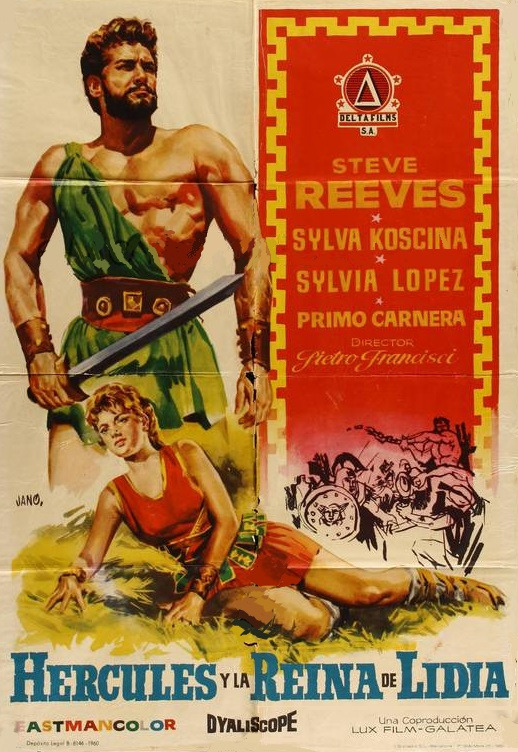
But no matter what I may think of it, this movie was still an even bigger success than its predecessor, to the point it made its producing company, the studio Galatea, one of the biggest movie companies of all of Italy. Unfortunately, it also was the end of the "original" Hercules movie series. The producer of the two first pieces, Lionello Santi, part of the Galatea studio, decided at the surprise of everyone to abandon the newborn ad successful franchise. He entrusted it to a certain Achille Piazzi, who decided to name as a new director for the third Hercules movie Vittorio Coffatavi, pushing Pietro Francisci away. Since Steve Reeves only wanted to work for Francisci and no one else, the actor of Hercules was also replaced, by Lou Degni - better known by his stage name, Mark Forest. And finally, "Hercules Unchained" marked the end of the Francisci-Bava collaboration. For you see, Mario Bava did even more work and poured even more effort (or so he claims) into "Hercules Unchained" than into the original "Hercules" , to the point he asked to be designated as a co-director in the movie's credits. But Francisci refused, claiming Bava hadn't done so much work as he claimed: Francisci insisted "Hercules Unchained" was his piece before all things, and that Bava just wanted to take credit for his work, and refused to change Bava's function in the official rolling credits. This battle led up to the two of them not working together anymore.
III/ Hercules becomes... Goliath?
The result of all these changes was a third Hercules movie release in 1960, called... "Goliath and the Dragon"?
This third movie's actual title is "Hercules' Revenge", "La vendetta di Ercole". However, the American distributors changed it to "Goliath and the Dragon" because they needed to make this movie a sequel to an earlier success, the Franco-Italian movie "Goliath and the Barbarians". Which... isn't even a movie about Goliath, but rather a historical movie about a guy named Emiliano in the 6th century... Ah those wacky American distributors, back at their hijinks...
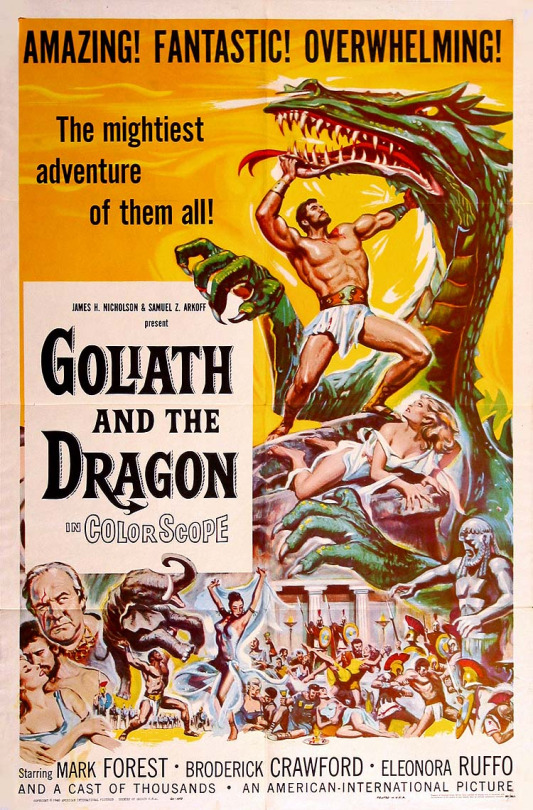
New director, new actor, new team... But also new scenario! Indeed, with this movie we have a fresh start, and a return to a more accurate depiction of Greek mythology... Well kind of. They kept numerous elements of the old movies, but brought in many more from the old Greek legends - the Twelve Labours for example (that Hercules finishes at the beginning of the movie with the taming of Cerberus), or his wife Dejanira. The story in itself, while trying to be more "Greek myth-flavored", is still a unique story mixing elements from various other tales. Hercules' son (turned into Goliath's brother in the American dub) is in love with Thea, who is unfortunately the daughter of a wicked king that wants to take the control of Thebes, Hercules' city. At first it seems the story will be just about the various manipulations and schemes of the wicked king and his allies to try to get rid of Hercules (for example making his son believe he wants to take Thea for his own, and using treacherous messengers to try to convince the poor boy to poison his father without realizing what he is doing) ; but then the third/fourth act of the movie completely takes us into a different direction, as now a prophecy by the gods overlaps with the conflict against the wicked king and... Its a bit convoluted.
I kind of skimmed through the movie because by now the "sequelitis" had started to really kick in. I will admit two good points for this piece: one they attempt to return to more mythologically faithful material, and even though they tell a new story they try to keep Greek elements in it (impossible love triangle between a son and a father, betrayals and tragic deaths within a same family, a hero going up against a wicked usurper king, prophecies the hero will try to fight against...). These efforts are unfortunately completely ruined by the American dub which changes the nature of everything. The second positive point would be the final part of the movie - when we leave the simple "romantic drama and political treacheries and other Shakespearian schemes" to enter the "let's fight a prophecy" domain. Hercules receives a prophecy that his son will take over the throne of the wicked king... in exchange for the life of "the woman who loves Hercules" (interpreted as his wife, Dejanira). As a result, the entire family of Hercules will struggle against this prophecy and try to avoid it - from Hercules becoming obsessively protective of his wife, to his son growing suicidal to protect his mother ; and here we really go into a much more emotional and human side of the story. We even have Hercules turning against the gods for this prophecy - despite having just finally cleared up his curse and made peace with them after his Labours, he still can't accept having his family doomed like that - going for the help of an oracle only for her to get KILLED when she disobeys the gods to bring him aid ; and it comes to Hercules being forced to make a heroic sacrifice, destroying his life to save others... There's really something more unique and touching in all that, that also reasonates well with Greek myths.
All that being said: the bad points. The Hercules movie of the era grew by the 70s and 80s to be synonymous with "hilarious kitsch comedy". Nobody could take them seriously anymore - and this movie really shows why. The first two Hercules pieces have laughable elements - but many were intended as light-hearted comedy, and the others still leave room for the seriousness of the piece. But here? Nah. On one side you have the special effects that aged very, very badly - resulting in the goofiest dragon and most ridiculous Cerberus battle you will ever see and the cheapest lightning effect ever made. And if the bad special effects weren't enough, you also have the American dub that changes the whole stories and tries its harder to rewrite the Greek myth into a more generic-fantasy things (while also fitting to a previous unrelated movie), resulting in a plotline even MORE convoluted than what it already was... This movie can be fun to watch just to see how ridiculous it all got, and unfortunately the most serious and interesting parts only come to us after bunch and bunch of cliches, convoluted writing, very bad dialogues (like REALLY bad) and papier-mache monsters.
[As a quick note here, this movie was also a step-up in the genre when it comes to the supernatural. You see, the first two movies actually had a more... let's say "realistic" approach to the magical elements of mythology. The gods and the supernatural was definitively real, but the movies made sure to frame it in a quite "realistic" light. The gods themselves never appear, and only speak through oracles or manifest through sudden changes in the weather. The monsters our hero fights are all just regular animals (a lion, a bull - well a bison they try to pass off as a bull), and even the "strange land of Colchides filled with wonders" is framed realistically as a sort of patch of land where prehistoric times continued on untouched (with the "monsters" there being just cavemen/Prehistoric men ; and the "dragon" being a dinosaur). And from the realm of the divine we have people with clearly supernatural abilities (Hercules with his immense strength, the oracles able to predict the future), but they still look like ordinary people... This all served the purpose of conveying the fantasy of the myths while working within limitations of budget and special effects.
This movie decided to actually bring the fantasy to screen by having actual monsters, and having the oracle fade in and out like a ghost, and a centaur turning into a satyr, and having the gods speak directly to the heroes or shooting lightning bolts at those they dislike... But as I said those special effects aged very, very poorly, and it is precisely by trying to do a "big show" that they actually ruined this strange worldbuilding-charm that worked so fine for the first two movies. "Showing less does more", as they say.]
IV/ Hercules against... vampires?
While Francisci and Bava never worked together again, both returned to the making of Hercules movies later on, each on their own.
Francisci released in 1963 a movie called "Hercules, Samson and Ulysses" (in its original title "Ercola sfida Sansone"), taking back the duo of Hercules and his sidekick Ulysses from the original movies, and having them confront the Biblical Samson... But given we are entering mythological crossovers, I will not be looking at this movie in any more details.
As for Mario Bava, in 1961 he released a movie co-made with Francesco Prosperi (and with Western Germany), "Ercole al centro della terra" - Hercules at the center of the earth. In America it was released as "Hercules in the Haunted World", but in many European countries, includng France, this piece's title was... "Hercules against the vampires". Why? Simply put: because the main villain is played by none other than Christopher Lee, and he plays a character with similarities to Dracula... As a result advertisers decided putting a big "vampire" stamp on this movie would work, despite it having no actual vampire.

The story is simple: Hercules returns to his home in Italy (remember we are still in a Greco-Roman mythology setting) after a war, only to discover his fiancée Dejanira (or Deianira as you English people like to call her) has fallen into an unexplained state of madness... An oracle tells Hercules the only way to save her is a magical stone from the realm of Hades. Hercules and his friend Theseus descend into the Underworld, unaware that Dejanira' caring uncle (Christopher Lee) is actually the one who caused her madness, and an evil sorcerer conspiring with the forces of evil to conquer the world...
Unlike the previous movie, "Hercules in the Haunted World/Hercules at the Center of the Earth" is much more of a "must watch" - or rather of a far better quality than its predecessors. We return to the charm and power of the earlier Hercules movie, but are then taken into a completely different direction thanks to Bava being able to truly make a movie of his own, with all the experience he gathered since the first Hercules. While the story veer into a much more... "fantasy" tone and plot, it is still a definitively "Greek mythology-inspired" type of fantasy, as elements of the legends of both Herakles and Theseus abond (descending into the Underworld, Deianira, the Hesperides and their golden apple, Procrustes and other of the bandits/threats Theseus had to face during his journeys...). Mind you, it is not because the Greek mythology elements and influence are everywhere that this movie is faithful to the legends, oh no, great liberties are taken here... Medea is now an oracle for the gods, Pluto becomes an evil god, you have references to Dante's Inferno while travelling through Hades, the Hesperides become daughters of Helios cursed by Pluto and entrapped in a land of endless midnight... This is definitively not a class about Greek mythology.
But the real strength of this movie, its real greatness (beyond Christopher Lee's presence, because come on, every Christopher Lee scene is great), is its visuals. This movie is a visual delight. Bava really used all of his tricks as a lighting and special effects guy - despite the movie having a not so big budget, Bava managed to created a gigantic fantasmagoria and epic sets and deeply oniric scenes simply through the use of colors, ciaroscuro, optical illusions, set design, and the power of not doing too much. In many ways this movie is the complete reverse of "Goliath and the Dragon": the "Goliath" movie tried to have these big impressive special effects but just became a cheesy, badly-aged kitsch piece ; while the Mario Bava movie is deeply otherwordly and haunting despite a quite limited budget and not doing "too much". (Mind you, not all things aged well, for example Procrustes' costume aged a lot, but the scene of Hercules climbing the giant tree of the Hesperides for example is wonderful).
Another slight flaw I would point out is that they have a very annoying "comical relief sidekick character" that... literaly serves no real purpose and I don't know why he is here, and he kind of ruins the mood (except for maybe one good joke). But this is definitively a movie to WATCH (not obviously appreciate, but just watch) - and it is disponible freely on Youtube in HD if you ever want to watch it. This movie, in fact, caused a brief wave of "creepy peplum" movies, a sort of... sub-genre crossing the "sword and sandal" with elements of horror movies (the "trio" of these morbid peplum movies tend to include Riccardo Fera's "Maciste in Hell" (The Witch's Curse, by American title), and Corbucci & Gentilomo "Maciste against the ghost/Goliath and the vampires/Maciste contro il vampiro".
What else to say... This Hercules was played by Reg Park, who would become the mentor of Arnold Schwarzenegger, who himself would later play Hercules. And oh yes, as a side note here: I haven't talked about this before in detail, but a departure from the Greek mythology is that in all those movies, and it is a common link between all of them, the character of Hercules is not a mortal who after death becomes a god, but the reverse. A great deal and great stress is placed on the fact that Hercules is an immortal among mortals, and a "god among men", and many times you will see or hear Hercules deciding to renounce his immortality or use his immortality as a bargaining chip... This builds an entirely different character, and a sort of meta-continuity for the cinematic incarnation of Hercules that neatly separates him from his mythical counterpart.
V/ The importance of the Hercules saga, and why it shaped Disney's Hercules
So... four movies (plus one mentioned). I said that the 1958 Hercules movie had been a huge success not just in Italy but in Europe as a whole. What I however did not say, because I wanted to keep it more of a surprise, is that this movie was an ENORMOUS success in the USA. Probably much bigger than you think.
The first two movies, "Hercules" and "Hercules Unchained" as they were named in English, were bought, translated and transported to the USA by Joseph E. Levine. Levine poured a LOT of money into a very aggressive and intense advertisement campaign to promote those movies, which not only were everywhere in theaters, but also aired on television. And this all resulted in a massive success, which gave Levine an entryway to build a big career in the movie industry, and the Hercules movies a lasting fame up until the 70s. By the mid-70s their fame and success slowly died out, from the tastes changing (making these pieces look ridiculous by modern audiences) to the television-copies of the movies being of very poor quality and badly preserved. By the 80s, these movies were a laughingstock, and the original duo of "Hercules" and "Hercules Unchained" even got a full-on parody in 1997. The two movies were recut into one, a whole new comical dub was made, and this resulted in "Hercules Recycled", about a TV exercise show-host who battles dinosaurs, fast-food obsessed mutants and insurance salesmen to save Earth by retrieving a secret formula inscribed onto a golden bath-mat...
But another one of the reasons the "Hercules" movies ended up being rejected and mocked mercilessly was oversaturation.
When people saw that "Hercules" and "Hercules Unchained" were HUGE successes both in Europe and America... The hunt was open, and it was free market for all. Everybody tried to recreate the movies, everybody tried making sequels of the movies, everybody did blatant rip-offs of the movies... In Italy at least, which was where the whole craze took place. It was the era of the "mythological peplum", of the "sword-and-sandal", of the "muscle-opera". During the 60s, around TWO HUNDRED movies based on the same principles, cliches and formulas were made for European and American audiences: movies taking place in a vague and unclear Antiquty, inspired by Greco-Roman mythology or Biblical stories, with a very muscular, oily, barely-dressed bodybuilder playing the hero, and him punching his way through soldiers and bandits and monsters, while trying to win the heart of a beautiful princess (or avoiding the deadly charm of wicked queens and enchantresses) - and with sometimes a plucky sidekick or comical relief by his side. Many were the protagonists of these tales, but ultimately they were all avatars of the same archetype: Hercules, Samson, Goliath, Ursus, Maciste were all replacable with each other.
Such an intense and fast mass-production of course brought the early death of the genre, that became "out" just as fast as it was "in"... Before it was replaced by the new cinematic craze coming from Italy and imported to the USA: the "western spaghetti", star of the 70s.
But this era left a deep mark onto America (and Europe too). In America, they were the reasons why the name "Hercules" became more famous than "Herakles". These movies were a prolongation of the bodybuilding trend, and of the athletic culture and body-worship and sport craze that had been started by the Mister Universe contest and the Charles Atlas celebrity. And - more interestingly perhaps for this website - these movies were also very influential and appreciated by homosexual communities of the 60s and 70s... I mean you literaly had muscular hunks bare-chested, oily and sometimes almost entirely naked, wrestling constantly with other half-dressed men, and surrounded by pretty girls and erotic sex-icons and pin-ups, who wore the toga-equivalent of the "chainmail bikini" of Conan fantasies... These movies were bound to attract gays and lesbians of their time.
There is a LOT of those Italian Hercules movies in the 60s, like a LOT. I can't possibly cover them all, but I will leave here the titles of some I will definitively not talk about (due to not being "Greek mythology" enough for my taste): 1961's "Sansone"/"Samson against Hercules" ; 1962's "La furie di Ercole" (The fury of Hercules) ; 1963 "Ercole contro Moloch" (Hercules against Moloch), 1964's "Ercole contro Roma" (Hercules against Rome), 1964's "Il trionfo di Ercole" (Hercules' Triumph), 1964's "Hercules against the sons of the sun", 1964's "Ercole, Sansone, Maciste e Ursus gli invincibili", 1964's "Hercules against the tyrants of Babylon"...
And even by leaving out those eight movies, with the five others I described before, I have still left, in the span of the Italian 60s, SIX more movies I could possibly talk about... As I said, we know around 200 movies were released during this decade in Italy - though hopefully for us, all the lesser and cheap ones faded into obscurity...
#greek mythology#greek mythology media#herakles#heracles#hercules#history of cinema#italian movies#italian cinema#american cinema#greek mythology movies#gay culture#mario bava#pietro francisci#steve reeves#ulysses#odysseus#theseus#christopher lee#the golden fleece#cerberus#omphale#jason#the argonauts
36 notes
·
View notes
Text

The Warrior Empress, US Lobby Card. 1960
7 notes
·
View notes
Text
On March 24, 2015, the Mystery Science Theater 3000 version of Hercules was released on DVD.

#hercules#mystery science theater 3000#mst3k#mst3k fan art#mst3000#the labours of hercules#pietro francisci#steve reeves#historical fantasy#fantasy adventure#italian film#fantasy adventure film#sword and sandal#greek mythology#adventure film#movie art#art#drawing#movie history#pop art#modern art#pop surrealism#cult movies#portrait#cult film
5 notes
·
View notes
Text
Gli esordi inediti di Gina Lollobrigida al Cinema Ritrovato
BOLOGNA – Da una valigia nascosta sono riemersi gli esordi da protagonista di Gina Lollobrigida: tre film-canzone di cui non v’è traccia nelle filmografie, sorta di videoclip d’epoca, girati da Pietro Francisci (regista campione d’incassi nel secondo dopoguerra con film d’avventura e di carattere mitologico) tra il 1947 e il 1948, la cui protagonista è una misteriosa Diana Lori, ovvero una Gina…
View On WordPress
0 notes
Photo

(via PEPLUM TV: Behind-the-Scenes)
Director Pietro Francisci overlooks Steve Reeves and Sylva Koscina on the set of HERCULES (1958). This is the very last scene in the movie. Reeves' costume is cool but we don't much of it in the movie.
16 notes
·
View notes
Text
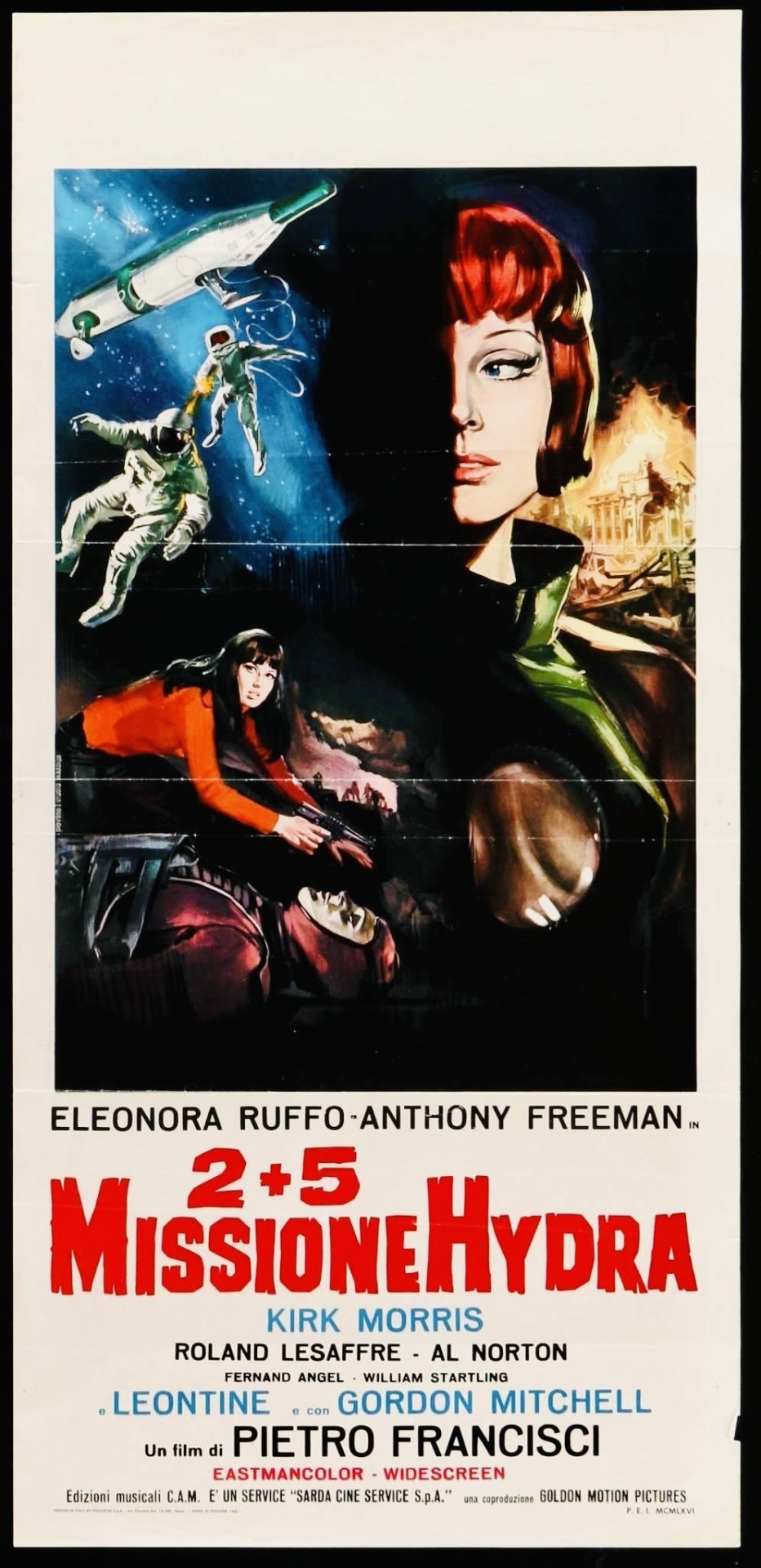
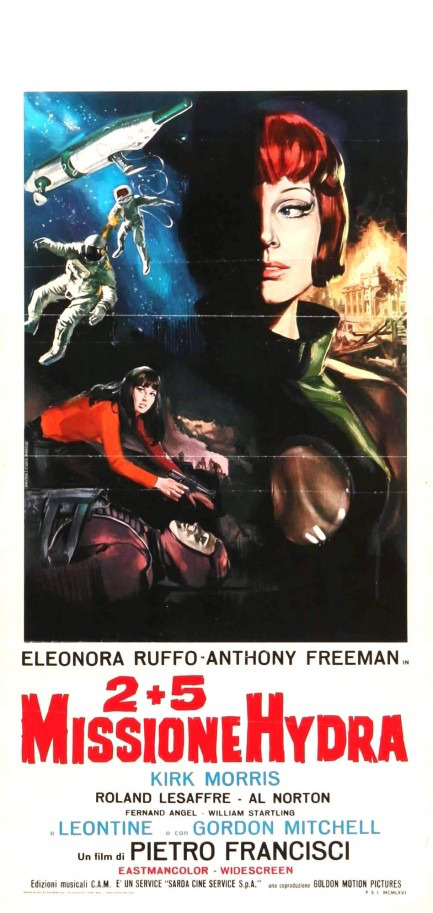
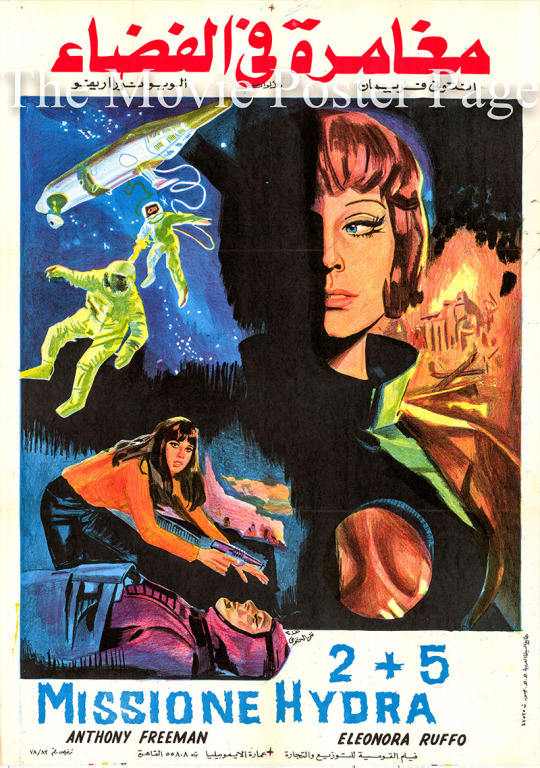
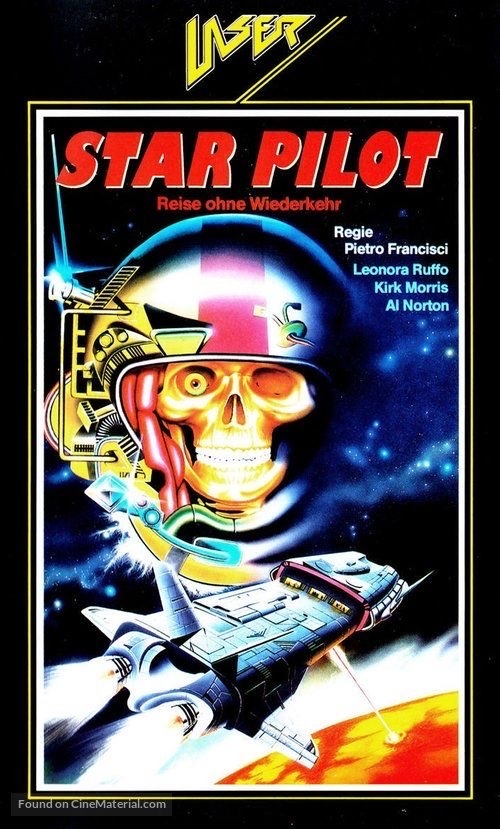

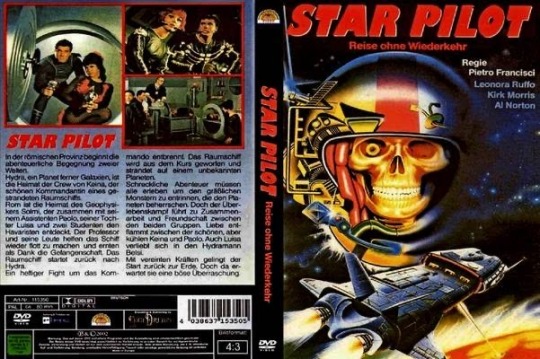
#2+5 missione hydra#francisci#pietro francisci#leonora ruffo#eleonora ruffo#gordon mitchell#horror scifi#sci fi
4 notes
·
View notes
Photo

Star Pilot | 1966
#Star Pilot#2+5: Missione Hydra#Pietro Francisci#Leonora Ruffo#kissing#monster suit#space opera#me and bae#boo#sasquatch#Italian scifi#Hammersmith Horror
191 notes
·
View notes
Text

Hercules Unchained (1959) dir. Pietro Francisci
1 note
·
View note
Photo

Hercules Unchained / Ercole e la regina di Lidia (1959)
1 note
·
View note
Photo

Attila (1954) Alfa-Panorama Film & Video Oy https://www.videospace.fi/release/0ZYiFGv9 'HUNNIEN SÄÄLIMÄTÖN KUNINGAS VERISIN VALLOITTAJA MITÄ HISTORIA ON KOSKAAN TUNTENUT!'
#Videospace#vhs#Attila#Pietro Francisci#Anthony Quinn#Sophia Loren#Henri Vidal#VHS tapes#VHS art#VHS cover
2 notes
·
View notes
Text

Gino Cervi-Sylva Koscina "La batalla de Siracusa" (L´assedio di Siracusa) 1960, de Pietro Francisci.
7 notes
·
View notes
Photo

Ercole: ‘’I’ve come a long way. Seeing you was worth it.’’
Princess Iole: ‘’How simple men are. As though I were a plant or an animal. Still, I thank you, you know.’’
Steve Reeves as Ercole (Hercules) and Sylva Koscina as Princess Iole in a publicity photo for the peplum film Le fatiche di Ercole (’The labours of Hercules’ | English title: Hercules, Italy, 1958, dir. Pietro Francisci) | Lux Film / Galatea Film / Warner Bros.
#Steve Reeves#1958#Sylva Koscina#film#Hercules#Ercole#Le fatiche di Ercole#Pietro Francisci#peplum#movies#Italy#Lux Film#Galatea Film#Warner Bros#Roman epic#gladiator#quote#citation#dialogue#actrice italienne
47 notes
·
View notes
Text

The Warrior Empress, US Lobby Card. 1960
4 notes
·
View notes
Text
On July 22, 1959, Hercules debuted in the United States.

#jercules#the labours of hercules#pietro francisci#steve reeves#historical fantasy#sword and sorcery#sword and sandal#fantasy adventure#greek mythology#adventure film#movie art#art#drawing#movie history#united states
1 note
·
View note